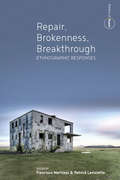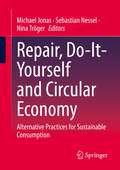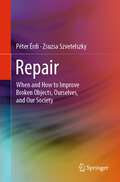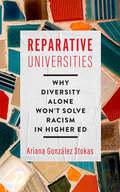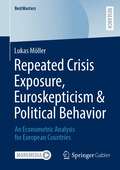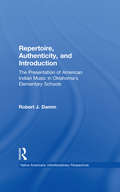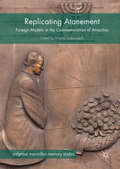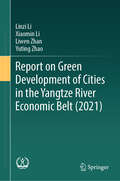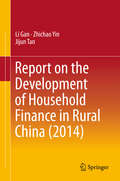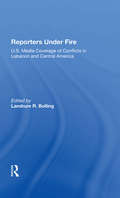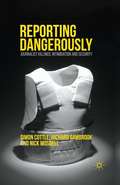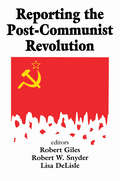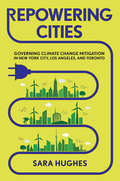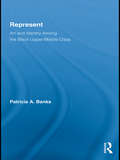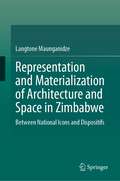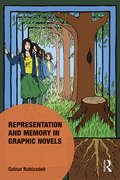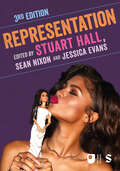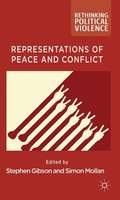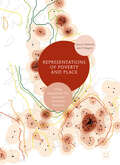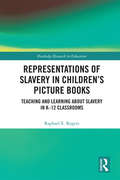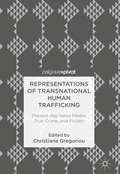- Table View
- List View
Repair, Brokenness, Breakthrough: Ethnographic Responses (Politics of Repair #1)
by Francisco Martínez Patrick LavioletteWhat does it mean to claim that something is broken? What is the connection between tinkering and innovation? And how much tolerance for failure do our societies have? Exploring some of the ways in which repair practices and perceptions of brokenness vary culturally, Repair, Brokenness, Breakthrough argues that repair is an attempt to extend the life of things as well as an answer to failures, gaps, wrongdoings and leftovers. The set of contributions illustrates the strong affective power hidden in situations of disrepair and repair; broken objects often bring strong emotions into play, but also energising reactions of creative action.
Repair, Do-It-Yourself and Circular Economy: Alternative Practices for Sustainable Consumption
by Michael Jonas Nina Tröger Sebastian NesselRepair & Do-It-Yourself activities on the one hand and discussions about the circular economy on the other hand are currently regarded as promising examples of how current modes of consumption and production can be reorganized and redesigned in the sense of a sustainable society. This volume discusses the relevance, the interactions as well as the possibilities and limits of the aforementioned phenomena of repairing, do-it-yourself and longer use on the one hand and the circular economy on the other, from both a scientific and a practical perspective.
Repair: When and How to Improve Broken Objects, Ourselves, and Our Society
by Péter Érdi Zsuzsa SzvetelszkyThis book propagates a new way of thinking about managing our resources by integrating the perspectives of complex systems theory and social psychology. By resources, the authors mean objects, such as cell phones and cars, and human resources, such as family members, friends, and the small and large communities they belong to. As we all face the "replace or repair" dichotomy, readers will understand how to repair themselves, their relationships, and communities, accept the "new normal," and contribute to repairing the world. The book is offered to Zoomers, growing up in a world where it seems everything is falling apart; people in their 30s and 40s, who are thinking about how to live a fulfilling life; people from the Boomers generation, who are thinking back on life and how to repair relationships. The Reader will enjoy the intellectual adventure of connecting the natural and social worlds and understanding the transition's pathways from a "throwaway society" to a "repair society.
Reparative Universities: Why Diversity Alone Won't Solve Racism in Higher Ed (Critical University Studies)
by Ariana González StokasA timely investigation of why diversity alone is insufficient in higher education and how universities can use reparative actions to become anti-racist institutions.As institutions increasingly reckon with histories entangled with slavery and Indigenous dispossession, diversity, equity, and inclusion (DEI) efforts occupy a central role in the strategy and resources of higher education. Yet reparation is rarely offered as a viable strategy for institutional transformation. In Reparative Universities, Ariana González Stokas undertakes a critical and decolonial analysis of DEI work, linking contemporary practices of diversity to longer colonial histories. González Stokas argues that diversity is an insufficient concept for efforts concerned with anti-oppression, anti-racism, equity, and decolonization. Given its historical ties to colonialism, can higher education foster reconciliation and healing?Reparation is offered as a pathway toward untangling higher education from its colonial roots. González Stokas develops the term "epistemic reparation" to describe a mode of social-historical accountability that can already be seen at work in historical examples, as well as current events in the United States, South Africa, and Canada. Recent legal decisions by Georgetown University and the Princeton Theological seminary to enact economic recompense for buying and selling human beings are evidence of attempts to redress higher education's violent histories and the colonial structures they reproduce every day on college campuses. Engaging with a broad range of theories from decolonial philosophy to organizational psychology, González Stokas offers a pathway—guided by reparative activities—for institutional workers frustrated by what often feels, as Sara Ahmed describes, like "banging one's head against a brick wall." Reparative Universities offers insight into why DEI efforts have been disconnected from past injustices and why unsettling diversity and engaging meaningful repair are critical for the future of higher education.
Reparieren, Selbermachen und Kreislaufwirtschaften: Alternative Praktiken für nachhaltigen Konsum (Kritische Verbraucherforschung)
by Michael Jonas Nina Tröger Sebastian NesselRepair & Do-It-Yourself Aktivitäten auf der einen Seite und Diskussionen über die Kreislaufwirtschaft auf der anderen Seite gelten aktuell als vielversprechende Beispiele, wie derzeitige Konsumtions- und Produktionsweisen im Sinne einer nachhaltigen Gesellschaft reorganisiert und umgestaltet werden können. Der Band diskutiert sowohl aus wissenschaftlicher als auch aus praxisbezogener Perspektive die Relevanz, die Wechselwirkungen wie auch die Möglichkeiten und Grenzen der genannten Phänomene des Reparierens, Selbermachens und Länger Nutzens einerseits und des Kreislaufwirtschaftens andererseits.
Repeated Crisis Exposure, Euroskepticism & Political Behavior: An Econometric Analysis for European Countries (BestMasters)
by Lukas MöllerIn Europe, the last decade has been shaped by euro crisis, migration crisis and corona crisis. Studies have analyzed how citizens react to crises in their voting behavior. This political economy analysis examines the research gap to what extent repeated crisis exposure within a short period of time can deepen existing Euroskepticism. It is defined as an index consisting of the individual identification as European, the view on the EU and on own country’s benefits of EU membership. Survey results of the Eurobarometer of all 28 EU member states, including the United Kingdom, in combination with macroeconomic data are analyzed using modern econometric methods. Bootstrapping and entropy balancing ensure conservative estimates. We find that a single crisis exposure increases existing Euroskepticism, but that the temporal distance between the crises matters. The impact of a crisis on the current situation marginalizes with its temporal distance. Furthermore, a hysteresis-like effect occurs: After the crisis ends, the Euroskepticism level does not go back to its pre-crisis level. Especially today, when (Western) democracy is under attack from many sides, this work extends the understanding of the influence of crises on political behavior aiming to derive recommendations how to act in the future.
Repertoire, Authenticity and Introduction: The Presentation of American Indian Music in Oklahoma's Elementary Schools (Native Americans: Interdisciplinary Perspectives)
by Robert J. DammThis study provides new information regarding the instruction of American Indian music in Oklahoma, and shows the effect of demographic variables of teachers and students on pedagogical context and practice.
Replicating Atonement
by Mischa GabowitschThis collection examines what happens when one country's experience of dealing with its traumatic past is held up as a model for others to follow. In regional and country studies covering Argentina, Canada, Japan, Lebanon, Rwanda, Russia, Turkey, the United States and former Yugoslavia, the authors look at the pitfalls, misunderstandings and perverse effects-but also the promise-of trying to replicate atonement. Going beyond the idea of a global or transnational memory, this book examines the significance of foreign models in atonement practices, and analyses the role of national governments, international organisations, museums, foundations, NGOs and public intellectuals in shaping the idea that good practices of atonement can be learned. The volume also demonstrates how one can productively learn from others by appreciating the complex and contested nature of atonement practices such as Germany's, and also by finding the necessary resources in the history of one's own country.
Report on Green Development of Cities in the Yangtze River Economic Belt (2021)
by Yuting Zhao Linzi Li Xiaomin Li Liwen ZhanThe report aims to help the cities in the Yangtze River Economic Belt of China identify their potentials for green development, especially to find their own suitable green development paths. Based on the evaluation, six green development models that can be replicated and promoted are initially established by selecting typical cities as pilot. The report is the first volume of its series and will be updated annually with more abundant green development models.
Report on Yangtze River Rehabilitation and Protection 2019
by CWRCThis book summarizes the achievements and experience of the Yangtze River rehabilitation and protection, analyzes the new situation and requirements of the Yangtze River rehabilitation and protection, and discusses the main issues and their solution alternatives for the Yangtze River rehabilitation and protection efforts. The Yangtze River, respected as the mother river of the Chinese nation, contributes immensely toward the socioeconomic development of China and braces up the national strategies such as the development of the Yangtze River Economic Belt and the integrated development of the Yangtze River Delta, etc. Whether the Yangtze River is under good stewardship has implications on not only the wellbeing of more than 400 million inhabitants in the basin, but also in broader sense the overall sustainability of socioeconomic development of the whole country. This book which has two parts, provides a multidirectional analysis of Yangtze River rehabilitation and protection. The first part explores the stages, achievements, and the future of the Yangtze rehabilitation and protection. Major issues existing in Yangtze River Basin rehabilitation and protection are discussed in the second part. Many pictures, charts, and diagrams are involved providing an understanding of the situation of Yangtze River Basin.
Report on the Development of Household Finance in Rural China
by Li Gan Zhichao Yin Jijun TanThe book reports on the development of householdfinances in rural China. It is based on the results of an on-site surveyconducted door to door by a research team from the Survey and Research Centerfor China Household Finance, the largest survey center in China - and perhapsthe world - that specializes in Chinese household finances. Directed byfinancial experts that enjoy the highest honors in their field and the largest interviewer group in China, it reveals the most realisticpicture of rural China available today and highlights a topic about whichpeople worry most: household finances. By reading this inspiring report,readers will be able to better understand China from a household financeperspective.
Reporters Under Fire: U.s. Media Coverage Of Conflicts In Lebanon And Central America
by Landrum R BollingNews media professionals, especially those covering political events or wars, are often accused of distorting the news or presenting biased and superficial analyses. Coverage of the recent conflicts in Central America and the Middle East has been especially controversial. In this volume, which is based on a series of seminars sponsored by the Institute for the Study of Diplomacy at Georgetown University, experienced journalists and media critics assess the complaints about coverage and the defenses the media marshall against those complaints. They explore the dilemmas that democratic societies face in trying to preserve traditional freedom of expression while pursuing political goals in ways that may involve the use of force. By analyzing the political impact of television coverage of battlefield scenes and the practical limitations and difficulties under which the media must work, the authors illuminate the powerful role of the media in the shaping of American politics, including diplomatic and military policies.
Reporting Dangerously: Journalist Killings, Intimidation and Security
by Simon Cottle Richard Sambrook And Nick MosdellMore journalists are being killed, attacked and intimidated than at any time in history. Reporting Dangerously: Journalist Killings, Intimidation and Security examines the statistics and looks at the trends in journalist killings and intimidation around the world. It identifies what factors have led to this rise and positions these in historical and global contexts. This important study also provides case studies and first-hand accounts from journalists working in some of the most dangerous places in the world today and seeks to understand the different pressures they must confront. It also examines industry and political responses to these trends and pressures as well as the latest international initiatives aimed at challenging cultures of impunity and keeping journalists safe. Throughout, the authors argue that journalism contributes a vital if often neglected role in the formation and conduct of civil societies. This is why reporting from ‘uncivil’ places matters and this is why journalists are often positioned in harm’s way. The responsibility to report in a globalizing world of crises and human insecurity, and the responsibility to try and keep journalists safe while they do so, it is argued, belongs to us all.
Reporting the Post-communist Revolution
by Robert SnyderThe events of 1989 were the material of great reporting. They also revealed the power of journalism. Long before people in Central and Eastern Europe liberated themselves, they discovered democratic freedom, putting to print their own ideas and chronicling events of the day. Indeed, long before they had democracies in law, they had imagined them on paper.In the Solidarity network that produced books and leaflets and news bulletins, in the essays of Václav Havel, in the samizdat publishing house in Budapest that used a portable printing machine, Eastern Europeans demonstrated the organic link between journalism and self-government. They showed how journalism nurtures the imagination, dialogue, and honesty that are basic to democratic life.If history had ended in 1989, there would be cause for easy optimism. The changes that swept Central and Eastern Europe passed with relatively little bloodshed. But agonies of the former Yugoslavia, convulsions of the former Soviet Union, and enduring battles with censors and would-be censors bedevil emerging democracies. Not only does much remain for journalists to cover in Central and Eastern Europe, in some places there the fate of journalism is still an open question. For all these reasons, Reporting the Fall of European Communism explores, not only the events of 1989, but new stories that have emerged in Central and Eastern Europe over the past decade. This volume will be of interest to media professionals, academics and others with an interest in the power of journalism.
Repowering Cities: Governing Climate Change Mitigation in New York City, Los Angeles, and Toronto
by Sara HughesCity governments are rapidly becoming society's problem solvers. As Sara Hughes shows, nowhere is this more evident than in New York City, Los Angeles, and Toronto, where the cities' governments are taking on the challenge of addressing climate change.Repowering Cities focuses on the specific issue of reducing urban greenhouse gas (GHG) emissions, and develops a new framework for distinguishing analytically and empirically the policy agendas city governments develop for reducing GHG emissions, the governing strategies they use to implement these agendas, and the direct and catalytic means by which they contribute to climate change mitigation. Hughes uses her framework to assess the successes and failures experienced in New York City, Los Angeles, and Toronto as those agenda-setting cities have addressed climate change. She then identifies strategies for moving from incremental to transformative change by pinpointing governing strategies able to mobilize the needed resources and actors, build participatory institutions, create capacity for climate-smart governance, and broaden coalitions for urban climate change policy.
Represent: Art and Identity Among the Black Upper-Middle Class (Routledge Research in Race and Ethnicity)
by Patricia A. BanksPatricia A. Banks traverses the New York and Atlanta art worlds to uncover how black identities are cultivated through black art patronage. Drawing on over 100 in-depth interviews, observations at arts events, and photographs of art displayed in homes, Banks elaborates a racial identity theory of consumption that highlights how upper-middle class blacks forge black identities for themselves and their children through the consumption of black visual art. She not only challenges common assumptions about elite cultural participation, but also contributes to the heated debate about the significance of race for elite blacks, and illuminates recent art world developments. In doing so, Banks documents how the salience of race extends into the cultural life of even the most socioeconomically successful blacks.
Represent: The Unfinished Fight for the Vote
by Marc Favreau Michael Eric DysonRead about the electrifying and continuing fight for voting rights—and discover your place in it—in this dramatic exploration of American democracy, from renowned thought leader Michael Eric Dyson and widely celebrated author Marc Favreau. One of the most important and least understood true stories of our nation, the fight for representation is an ongoing and epic quest to build the democracy sketched out in the Constitution but unfinished in the twenty-first century. <P><P> With impeccable research and exhilarating prose, Represent tells the story of voting rights in the United States from the American Revolution up to the present day. Each chapter takes on a new battle between the forces of people power and forces opposed to it. Readers will meet champions of freedom, including formerly enslaved revolutionaries, a Chinese American teenager, a Lakota Sioux activist, Black World War II veterans, a Mexican American student, and others who fought for their right to vote. Drawing clear lines from then to now, Represent weaves this important struggle into a single American drama that will help readers understand our past, present, and future.
Representation and Materialization of Architecture and Space in Zimbabwe: Between National Icons and Dispositifs
by Langtone MaunganidzeThis volume is an empirical study examining the extent to which historic and iconic architecture and spaces in Zimbabwe - particularly in urban areas - have been mobilized to construct and reconstruct identities. The author explores the question of traditional and political architecture through analysis of a variety of structures, including monuments, museums, and indigenous and state buildings. Special attention is paid to the soapstone-carved Zimbabwe Bird, which for years has served as the national emblem. Overall, this book argues that while the production and use of architectural products and spaces have been regarded symbols of collective identity, they have also served as expressions of power and control.
Representation and Memory in Graphic Novels (Memory Studies: Global Constellations)
by Golnar NabizadehThis book analyses the relationship between comics and cultural memory. By focussing on a range of landmark comics from the twentieth and twenty-first centuries, the discussion draws attention to the ongoing role of visual culture in framing testimony, particularly in relation to underprivileged subjects such as migrants and refugees, individuals dealing with war and oppressive regimes and individuals living with particular health conditions. The discussion is influenced by literary and cultural debates on the intersections between ethics, testimony, trauma, and human rights, reflected in its three overarching questions: ‘How do comics usually complicate the production of cultural memory in local contents and global mediascapes?’, ‘How do comics engage with, and generate, new forms of testimonial address?’, and ‘How do the comics function as mnemonic structures?’ The author highlights that the power of comics is that they allow both creators and readers to visualise the fracturing power of violence and oppression – at the level of the individual, domestic, communal, national and international – in powerful and creative ways. Comics do not stand outside of literature, cinema, or any of the other arts, but rather enliven the reciprocal relationship between the verbal and the visual language that informs all of these media. As such, the discussion demonstrates how fields such as graphic medicine, graphic justice, and comics journalism contribute to existing theoretical and analytics debates, including critical visual theory, trauma and memory studies, by offering a broad ranging, yet cohesive, analysis of cultural memory and its representation in print and digital comics.
Representation: Cultural Representations and Signifying Practices (Culture, Media and Identities series)
by Jessica Evans Stuart Hall Sean NixonSince 1997 Representation has been the go-to textbook for students learning the tools to question and critically analyze media texts and images. This long-awaited third edition has been updated throughout to engage with the impact of digital technology and culture, and the changes in political culture, social movements and the cultural industries. The new edition includes: A new preface by Sean Nixon, focusing on digital media, and theories of representation. A new Afterword by Kobena Mercer to Stuart Hall’s classic chapter on ‘The Spectacle of the Other’ Revised chapters with additional content on digital media, de-westernising culture, imperialism and BLM, and new readings tying contemporary issues of race, gender and power A new chapter by Nancy Thumim exploring digital forms of self-representation and representation in/of Politics, looking at media spectacle, political imagery, the Me Too movement and Black Lives Matter. The Third Edition provides an indispensable resource for students and teachers in cultural and media studies.
Representation: Cultural Representations and Signifying Practices (Culture, Media and Identities series)
by Jessica Evans Stuart Hall Sean NixonSince 1997 Representation has been the go-to textbook for students learning the tools to question and critically analyze media texts and images. This long-awaited third edition has been updated throughout to engage with the impact of digital technology and culture, and the changes in political culture, social movements and the cultural industries. The new edition includes: A new preface by Sean Nixon, focusing on digital media, and theories of representation. A new Afterword by Kobena Mercer to Stuart Hall’s classic chapter on ‘The Spectacle of the Other’ Revised chapters with additional content on digital media, de-westernising culture, imperialism and BLM, and new readings tying contemporary issues of race, gender and power A new chapter by Nancy Thumim exploring digital forms of self-representation and representation in/of Politics, looking at media spectacle, political imagery, the Me Too movement and Black Lives Matter. The Third Edition provides an indispensable resource for students and teachers in cultural and media studies.
Representations of Peace and Conflict
by Stephen Gibson Simon MollanThis edited volume brings together a series of contributions exploring the socio-cultural and psychological representation of peace and conflict. It ventures into areas of the humanities and social sciences not typically foregrounded in Peace Studies, such psychology, sociology, media studies, cultural studies, history, and geography.
Representations of Poverty and Place: Using Geographical Text Analysis To Understand Discourse
by Laura L Paterson Ian N GregoryThis book explores a novel methodological approach which combines analytical techniques from linguistics and geography to bring fresh insights to the study of poverty. Using Geographical Text Analysis, it maps the discursive construction of poverty in the UK and compares the results to what administrative data reveal. The analysis draws together qualitative and quantitative techniques from corpus linguistics, critical discourse analysis, Geographical Information Science, and the spatial humanities. By identifying the place-names that occur within close proximity to search terms associated with to poverty it shows how different newspapers use place to foreground different aspects of poverty (including employment, housing, money, and benefits), and how the London-centric nature of newspaper reporting dominates the discursive construction of UK poverty. This book demonstrates how interdisciplinary research methods can illuminate complex social issues and will appeal to researchers in a number of disciplines from sociology, geography and the spatial humanities, economics, linguistics, health, and public policy, in addition to policymakers and practitioners.
Representations of Slavery in Children’s Picture Books: Teaching and Learning about Slavery in K-12 Classrooms (Routledge Research in Education #21)
by Raphael E. RogersDrawing on critical race theory, critical race feminism, critical multicultural analysis, and intertextuality this book examines how slavery is represented in contemporary children’s picture books. Through analysis of recently published picture books about slavery, Rogers discusses how these books engage with and respond to the historiography of the institution of slavery. Exploring how contemporary writers and illustrators have represented the institution of slavery, Rogers presents a critical and responsible approach for reading and using picture books in K-12 classrooms and demonstrates how these picture books about slavery continue to perform important cultural work.
Representations of Transnational Human Trafficking: Present-day News Media, True Crime, and Fiction
by Christiana GregoriouThis open access edited collection examines representations of human trafficking in media ranging from British and Serbian newspapers, British and Scandinavian crime novels, and a documentary series, and questions the extent to which these portrayals reflect the realities of trafficking. It tackles the problematic tendency to under-report particular types of victim and forms of trafficking, and seeks to explore both dominant and marginalised points of view. The authors take a cross-disciplinary approach, utilising analytical tools from across the humanities and social sciences, including linguistics, literary and media studies, and cultural criminology. It will appeal to students, academics and policy-makers with an interest in human trafficking and its depiction in the modern day.
